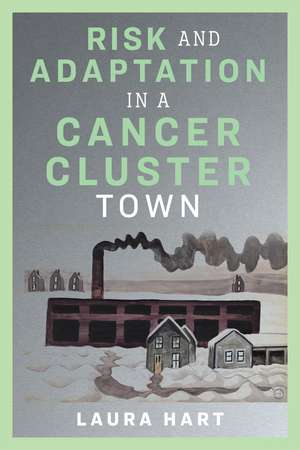Risk and Adaptation in a Cancer Cluster Town: Nature, Society, and Culture
Autor Laura Harten Limba Engleză Paperback – 16 iun 2023
In Risk and Adaptation in a Cancer Cluster Town, Laura Hart examines another understudied dimension of community inaction: the role of emotion and its relationship to community experiences of social belonging and inequality. Using a cancer cluster community in Northwest Ohio as a case study, Hart advances an approach to risk that grapples with the complexities of community belonging, disconnect, and disruption in the wake of suspected industrial pollution. Her research points to a fear driven not only by economic anxiety, but also by a fear of losing security within the community—a sort of pride that is not only about status, but connectedness. Hart reveals the importance of this social form of risk—the desire for belonging and the risk of not belonging—ultimately arguing that this is consequential to how people make judgements and respond to issues. Within this context where the imperative for self-protection is elusive, affected families experience psychosocial and practical conflicts as they adapt to cancer as a way of life. Considering a future where debates about risk and science will inevitably increase, Hart considers possibilities for the democratization of risk management and the need for transformative approaches to environmental justice.
Preț: 246.11 lei
Nou
Puncte Express: 369
Preț estimativ în valută:
47.09€ • 49.30$ • 38.97£
47.09€ • 49.30$ • 38.97£
Carte indisponibilă temporar
Doresc să fiu notificat când acest titlu va fi disponibil:
Se trimite...
Preluare comenzi: 021 569.72.76
Specificații
ISBN-13: 9781978823532
ISBN-10: 1978823533
Pagini: 176
Ilustrații: 2 B-W, 2 color
Dimensiuni: 152 x 229 x 13 mm
Greutate: 0.23 kg
Editura: Rutgers University Press
Colecția Rutgers University Press
Seria Nature, Society, and Culture
ISBN-10: 1978823533
Pagini: 176
Ilustrații: 2 B-W, 2 color
Dimensiuni: 152 x 229 x 13 mm
Greutate: 0.23 kg
Editura: Rutgers University Press
Colecția Rutgers University Press
Seria Nature, Society, and Culture
Notă biografică
LAURA HART is an assistant professor of sociology at Missouri State University. Her previous publications include “Emotion and Othering in a Contaminated Community” (Ethnography, 2022) and “Half the Battle: Social Support and Coping among Women with Cancer” (Qualitative Inquiry, 2016).
Cuprins
Preface and Acknowledgments
Introduction: The Town of Whirlpool
1 The Deregulation of Toxic Chemicals
2 Cancer in Clyde and “Will-o’-the-Wisp Things”
3 Emotion, Risk, and Othering
4 Embodied Risk
5 Toward Transformative Movements of Theory and Practice
Notes
Index
Introduction: The Town of Whirlpool
1 The Deregulation of Toxic Chemicals
2 Cancer in Clyde and “Will-o’-the-Wisp Things”
3 Emotion, Risk, and Othering
4 Embodied Risk
5 Toward Transformative Movements of Theory and Practice
Notes
Index
Recenzii
“Hart does an excellent job weaving local community narratives in with sociological insights and theories of risk and belonging. Risk and Adaptation in a Cancer Cluster Town offers a clear and important contribution to in-depth community studies of industrial risks and environmental health disaster.”
“Hart’s account of Clyde, Ohio leaves the reader feeling as though they’ve come to know the residents of this town, and it skillfully captures the complexity underlying a community’s response to chronic contamination and illness. It is an important contribution to the literature on risk, disasters, and the sociology of emotions.”
Descriere
Risk and Adaptation in a Cancer Cluster Town examines the role of emotion and its relationship to community experiences of social belonging and inequality. Using a cancer cluster community in Northwest Ohio as a case study, Laura Hart advances an approach to risk that grapples with the complexities of community belonging in the wake of suspected industrial pollution. Her research points to a fear driven not only by economic anxiety, but also by a fear of losing security within the community—a sort of pride that is not only about status, but connectedness. Hart reveals the importance of this social form of risk—the desire for belonging and the risk of not belonging—ultimately arguing that this is consequential to how people make judgements and respond to issues. Within this context, affected families experience psychosocial and practical conflicts as they adapt to cancer as a way of life. Hart ultimately presents possibilities for the democratization of risk management and underscores the need for transformative approaches to environmental justice.
















